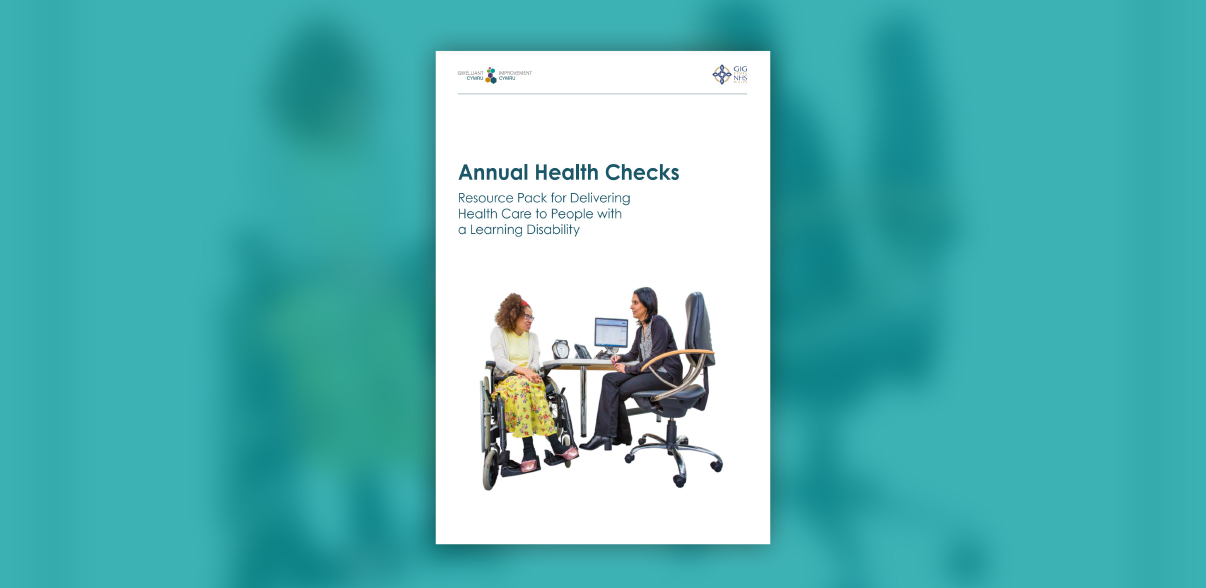The importance of Annual Health Checks (AHC) for people with a learning disability.
By Paula Phillips, Senior Improvement Manager, Learning Disability Improvement Cymru.

Over the past two years we have witnessed unprecedented demands on health services resulting in people having to get used to different ways of accessing health care. In many instances, routine work needed postponing and physical access to Primary Care became limited.
The impact of these changes for people with learning disabilities cannot be underestimated. Important routine health surveillance such as the Annual Health Check (AHC) is a key area of concern. This enhanced service is a proactive review of an individual’s health needs. It gives people with a learning disability the chance to get to know their practice and staff better. Should an individual become unwell or have health concerns, they will find it easier to make contact and communicate their symptoms and concerns.
A recent study of people with a learning disability living in Wales concluded that having a health check was associated with reduced deaths, especially for those with Down’s syndrome or people with a learning disability and Autism. For a population with higher prevalence of morbidity and mortality who face barriers to accessing care, its value is undeniable. This is echoed in the recently published NICE Impact report on People with Learning Disability. Challenges with delivering timely, safe and effective health care contributes to avoidable deaths, 41% of adult deaths were from treatable medical causes and 24% were from preventable medical causes. [1]
The COVID-19 pandemic has disproportionately affected those who already had the greatest health and social needs. People with learning disability were 6 times more likely to die from COVID-19 than other people.
Prior to the pandemic, uptake of AHCs in Wales was between 30% and 60%. Findings from a major UK study into the experiences of people with learning disabilities during the pandemic show that in Wales between September 2020 and March 2021 just 40% of respondents had a health check. [2] Across the UK only 38% of people who usually had an AHC had received one.[3] Worryingly, family and paid carers report the physical health of the person they cared for had declined. As we move into recovery it is important AHCs are prioritised in order to improve health outcomes, reduce health inequalities avoidable and premature deaths for this population. The NICE report recommends that health checks for people with a learning disability should be a priority area. This is echoed in Wales with Welsh Government’s commitment to improve access to good quality health checks in Wales. In order to support primary care services in Wales to deliver AHCs, Improvement Cymru have co-produced a set of accessible resources for use when inviting people to their health check.
The pack includes standardised, easy read documents to give out to people with a learning disability and/or their carers including invitation to book an AHC, an AHC appointment letter, an AHC checklist and a health action plan.
The Primary Care Annual Health Check Resource Pack can be found here.
For further information contact your local community learning disability team or, if available in your area, the Learning Disability Primary Care Liaison Service. Alternatively I am happy to help with any queries, please contact me at paula.phillips4@wales.nhs.uk.
[1] NICE. [2021], Impact Report: People with a learning disability. Available here: www.nice.org.uk/Media/Default/About/what-we-do/Into-practice/measuring-uptake/learning-disability-impact-report/Learning%20disability%20impact%20report.pdf All rights reserved. Subject to Notice of rights.
[2] Learning Disability Wales. [2021], https://www.ldw.org.uk/Wales-Easy-Read-Highlights-Wave-1-March-2021-.pdf
[3] Learning Disability Wales. [2021], Part 3 Findings from the coronavirus and people with a learning disability study. Available here: https://www.ldw.org.uk/part-3-findings-from-the-corona-virus-and-people-with-a-learning-disability-study/
NICE guidance is prepared for the National Health Service in England. All NICE guidance is subject to regular review and may be updated or withdrawn. NICE accepts no responsibility for the use of its content in this product/publication.

